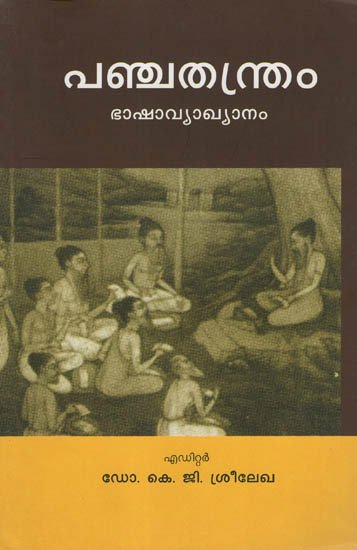Panchatantra [sanskrit]
by Dr. Naveen Kumar Jha | 2016 | 13,828 words | ISBN-13: 9788193077962
The Sanskrit edition of the Panchatantra referencing the English translation and grammatical analysis. Written by Vishnu Sharma and possibly dating as early as 1200 BCE, the Panchatantra (or Pancatantra) represents a collection of short stories teaching basic ethical values and moral conduct that was commonly practiced in ancient Indian. Alternative titles: Śrīviṣṇuśarman Pañcatantra (श्रीविष्णुशर्मन् पञ्चतन्त्र, Śrī-viṣṇuśarman pancatantra, श्री-विष्णुशर्मन्, Sri-visnusarman)
Verse 1.327
कर्ण-विषेण च भग्नः किं किं न करोति बालिशो लोकः ।
क्षपणकताम् अपि धत्ते पिबति सुरां नरक-पालेन ॥ ३२७ ॥
karṇa-viṣeṇa ca bhagnaḥ kiṃ kiṃ na karoti bāliśo lokaḥ |
kṣapaṇakatām api dhatte pibati surāṃ naraka-pālena || 327 ||
The English translation of Panchatantra Verse 1.327 is contained in the book The Complete Pancatantra: Sanskrit Text with English Translation by Dr. Naveen Kumar Jha. This book is not available online so in order to read the full text and translation you should buy the book:
Buy now! English translation by Dr. Naveen Kumar Jha (2016)
Glossary of Sanskrit terms
Note: This extracts Sanskrit terms and links to English definitions from the glossary, based on an experimental segmentation of verse (1.327). Some terms could be superfluous while some might not be mentioned. Click on the word to show English definitions.
Karna, Visha, Vishena, Bhagna, Kim, Karoti, Balisha, Loka, Kshapanaka, Api, Pibat, Sura, Naraka, Pala,
Analysis of Sanskrit grammar
Note: this is an experimental feature and only shows the first possible analysis of the Sanskrit text (Panchatantra Verse 1.327). If the system was successful in segmenting the sentence, you will see of which words it is made up of, generally consisting of Nouns, Pronouns, Verbs, Participles and Indeclinables. Click on the link to show all possible derivations of the word.
- Line 1: “karṇa-viṣeṇa ca bhagnaḥ kiṃ kiṃ na karoti bāliśo lokaḥ ”
- karṇa -
-
karṇa (noun, masculine)[compound], [vocative single]
- viṣeṇa -
-
viṣeṇa (noun, masculine)[compound], [vocative single]viṣeṇa (noun, neuter)[compound], [vocative single]viṣa (noun, masculine)[instrumental single]viṣa (noun, neuter)[instrumental single]
- ca -
-
ca (indeclinable conjunction)[indeclinable conjunction]ca (noun, masculine)[compound], [vocative single]ca (noun, neuter)[compound], [vocative single]
- bhagnaḥ -
-
bhagna (noun, masculine)[nominative single]
- kim -
-
kim (indeclinable interrogative)[indeclinable interrogative]kim (indeclinable)[indeclinable]kim (pronoun, neuter)[nominative single], [accusative single]
- kim -
-
kim (indeclinable interrogative)[indeclinable interrogative]kim (indeclinable)[indeclinable]kim (pronoun, neuter)[nominative single], [accusative single]
- na -
-
na (indeclinable particle)[indeclinable particle]na (noun, masculine)[compound], [vocative single]na (noun, neuter)[compound], [vocative single]
- karoti -
-
karoti (noun, masculine)[compound], [adverb]karoti (noun, feminine)[compound], [adverb]karoti (noun, neuter)[compound], [adverb], [nominative single], [vocative single], [accusative single]√kṛ (verb class 8)[present active third single]
- bāliśo* -
-
bāliśa (noun, masculine)[nominative single]
- lokaḥ -
-
loka (noun, masculine)[nominative single]
- Line 2: “kṣapaṇakatām api dhatte pibati surāṃ naraka-pālena ”
- kṣapaṇaka -
-
kṣapaṇaka (noun, masculine)[compound], [vocative single]
- tām -
-
tā (noun, feminine)[accusative single]sā (noun, feminine)[accusative single]
- api -
-
api (indeclinable preposition)[indeclinable preposition]ap (noun, neuter)[locative single]api (Preverb)[Preverb]
- dhatte -
-
√dhā (verb class 3)[present middle third single]
- pibati -
-
√pā -> pibat (participle, masculine)[locative single from √pā class 1 verb]√pā -> pibat (participle, neuter)[locative single from √pā class 1 verb]pibat (noun, masculine)[locative single]pibat (noun, feminine)[locative single]pibat (noun, neuter)[locative single]√pā (verb class 1)[present active third single]
- surām -
-
surā (noun, feminine)[accusative single]
- naraka -
-
naraka (noun, masculine)[compound], [vocative single]naraka (noun, neuter)[compound], [vocative single]
- pālena -
-
pāla (noun, masculine)[instrumental single]
Other editions:
Also see the following editions of the Sanskrit text or (alternative) English translations of the Panchatantra Verse 1.327
Pancatantra of Visnusarman
by M. R. Kale (2015)
Panchatantra in Simple Sanskrit
by Dr. Vishwas (2016)
Panchatantram (Telugu)
by Tadanki Venkata Lakshmi Narasimha Rao (2020)
Published by J. P. Publications, Vijayawada; Throughout black & white Illustrations; 9788192053851.
Buy now!Preview of verse 1.327 in Telugu sript:
కర్ణ-విషేణ చ భగ్నః కిం కిం న కరోతి బాలిశో లోకః ।
క్షపణకతామ్ అపి ధత్తే పిబతి సురాం నరక-పాలేన ॥ ౩౨౭ ॥
Panchatantram Bhashavyakhyanam (Malayalam)
by Dr. K.G. Sreelekha (2010)
Published by the University of Kerala.
Buy now!Preview of verse 1.327 in Malayalam sript:
കര്ണ-വിഷേണ ച ഭഗ്നഃ കിം കിം ന കരോതി ബാലിശോ ലോകഃ ।
ക്ഷപണകതാമ് അപി ധത്തേ പിബതി സുരാം നരക-പാലേന ॥ ൩൨൭ ॥
The Panchatantra Stories (Tamil)
by P. S. Aacharya (2017)
Published by Narmadha Pathippagam, Chennai.
Buy now!
Panchatantrer Galpa (Bengali)
by Children's Book Trust (2014)
Throughout color Illustration; 9788170112730
Buy now!Preview of verse 1.327 in Bengali sript:
কর্ণ-বিষেণ চ ভগ্নঃ কিং কিং ন করোতি বালিশো লোকঃ ।
ক্ষপণকতাম্ অপি ধত্তে পিবতি সুরাং নরক-পালেন ॥ ৩২৭ ॥
Panchatantra in Gujarati (Comic)
by Anant Pai (2013)
[શિયાળા અને રણશિંગ પંચતંત્ર] Published by Amar Chitra Katha; Throughout Color Illustrations; 9789350853115
Buy now!Preview of verse 1.327 in Gujarati sript:
કર્ણ-વિષેણ ચ ભગ્નઃ કિં કિં ન કરોતિ બાલિશો લોકઃ ।
ક્ષપણકતામ્ અપિ ધત્તે પિબતિ સુરાં નરક-પાલેન ॥ ૩૨૭ ॥
![Panchatantra [sanskrit] - book cover](/uploads/a/Pancatantra.jpg)






